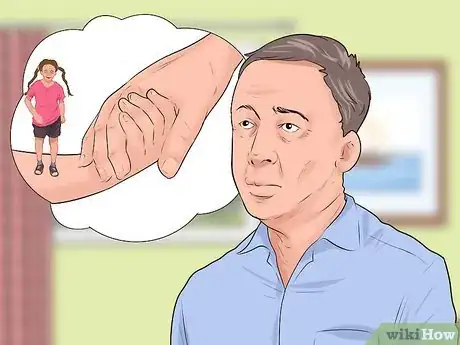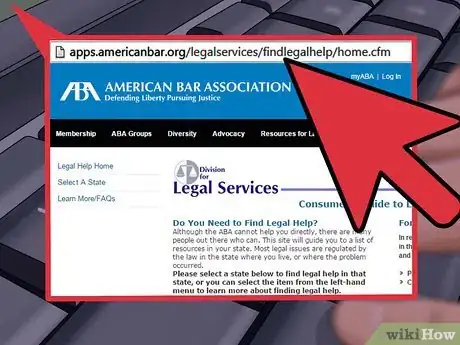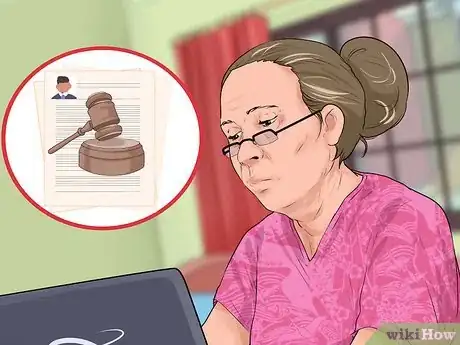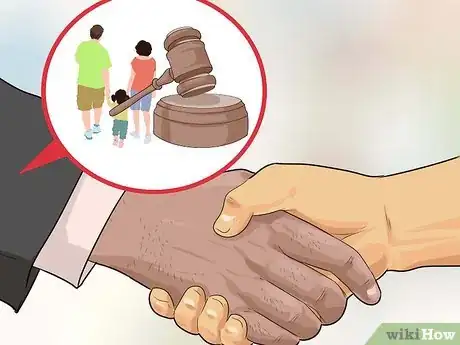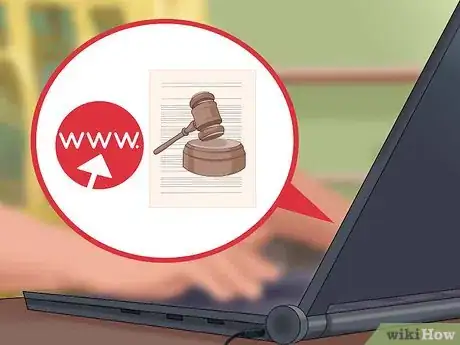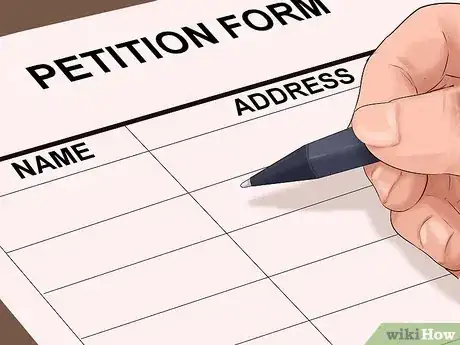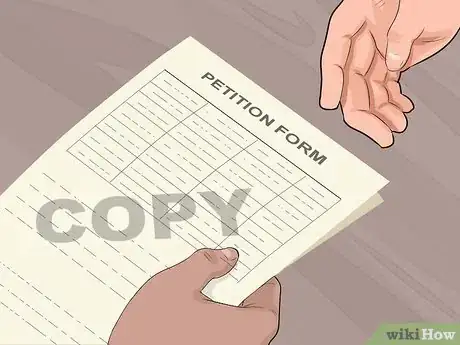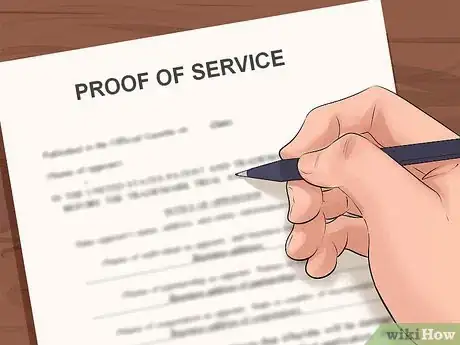This article was co-authored by Clinton M. Sandvick, JD, PhD. Clinton M. Sandvick worked as a civil litigator in California for over 7 years. He received his JD from the University of Wisconsin-Madison in 1998 and his PhD in American History from the University of Oregon in 2013.
There are 18 references cited in this article, which can be found at the bottom of the page.
This article has been viewed 18,406 times.
Sometimes serious disagreements crop up within families. These disagreement may limit or completely end visitation between grandparents and their grandchildren. Generally, these disagreements are moderately short lived and the family reunites. In some cases, however, grandparents are completely prohibited from seeing their grandchildren. If this happens, there are certain legal steps that grandparents can take to establish their right to visitation and, under certain extreme circumstances, they may also be able to seek custody. Grandparents’ legal rights vary from state to state. You should retain an attorney if you are considering pursuing a legal right to see your grandchildren.
Steps
Considering Your Options for Visitation or Custody
-
1Consider what rights you want. The first step in evaluating your rights as a grandparent is for you to determine what you are seeking. Are you seeking the right to spend time with your grandchild? Do you want the court to establish a visitation schedule? Are you seeking full or partial custody of the child? While it varies by state, all courts will consider what is in the best interest of the child. When determining the best interest of the child in a custody case, courts will try to determine:
- What arrangement will foster the child’s happiness, feeling of security and mental and emotional development.
- Court’s may consider the child’s wishes.
- Other sibling’s custody arrangements.
- Accessibility to school.
- Parental abuse or addiction.
- The need for a continued and stable home environment.[1]
-
2Understand visitation rights. Some grandparents will try to use the courts to reestablish their visitation with their grandchildren after a change in their relationship with the children’s parents, divorce or the death of one parent. While state laws vary on the circumstances under which grandparents can be awarded visitation, generally courts will evaluate the following:
- The relationship between the grandchild’s parents and whether they are both alive. Specifically, if the parents are happily married and the child is healthy, the courts will rarely overrule a parent’s decision to deny the grandparents access to the children. If however, a parent has died or become incapacitated and the healthy parent has unwarranted animosity against the grandparents, the court may choose to intervene.
- The relationship between the parents and the children.
- The relationship between the grandparents and the children.
- Ultimately, the court will determine whether it is beneficial to the child to have visitation with their grandparents.[2]
- You can review a state-by-state summary of laws impacting grandparents’ visitation and custody rights here: http://family.findlaw.com/child-custody/summaries-of-state-law-grandparent-visitation-and-custody.html.
Advertisement -
3Understand custody rights. It is much more difficult for a grandparent to be granted temporary or permanent custody of a grandchild if the child’s parents are still alive. If a grandparent petitions a court for custody, the court will still make its decision based on what is best for the child. However, grandparents must demonstrate extraordinary circumstances to win custody, such as:
- Child abandonment;
- Child abuse; or
- Child neglect.
- Some states will only allow grandparents to petition for custody if they can demonstrate that they have been acting in loco parentis to the child, meaning that they have been acting as a parent for a certain amount of time. The courts will look to see whether the child has been residing with the grandparent for an extended time when determining if the grandparent has a custodial right over the child.[3]
- Typically, courts will not grant custody to grandparents over a parent’s objection unless the parent(s) are shown to be unfit.[4]
Hiring a Lawyer
-
1Hire a family law attorney. Family law disputes can be very complicated, particularly custody disputes that are in opposition to a parent’s wishes. As the law favors parental custody and parents’ right to determine with whom the child has a relationship, grandparents are at a significant legal disadvantage. If you cannot work out a visitation schedule amicably with the parents, however, you may feel that going to court is your only option. You need to hire an experienced family law attorney to handle your case.
-
2Find an experienced attorney. Once you have decided to hire an attorney, your next step is to find an experienced and reputable family law attorney that can help you with your case. You can locate attorneys in a number of ways, including:
- Referral from friend or family member. If someone you know used a family law attorney, you can ask them whether they would recommend that attorney. A recommendation from a trusted person who has personal experience with a family attorney is a good place to start.
- Local or state legal bar associations. Local and state bar associations often provide referral services to attorneys in your area. Through state bar associations, you can check whether any complaints were filed against your prospective family law attorney. The American Bar Association has compiled a list of state-by-state resources that can direct you to attorney referral sites, such as contact information for state bar associations. The ABA provides this information at https://www.americanbar.org/groups/legal_services/flh-home/
-
3Check the attorneys’ credentials. After compiling a list of local family law attorneys consider evaluating their experience, credentials, and reputation in the legal field. You can do this in the following ways:
- Determine whether any complaints had been filed with state bar associations.
- Read through their website to make sure they specialize in family law.
- Examine their educational background.
- Read reviews about the attorney.
-
4Meet with prospective attorneys. Once you identified several reputable family law attorneys in your area or in the area where the case will be filed, you should consider meeting with these attorneys to discuss your legal needs. Often, attorneys will provide a free consultation for potential clients. You should be prepared for your first meeting with the lawyer in the following ways:
- Bring copies of any documents, photographs or information that is relevant to your case.
- Ask for an explanation of the fees and costs associated with a lawsuit and how often you would have to "refill" a retainer.
- Ask the attorney about their experience bringing visitation or custody cases on behalf of grandparents.
- Ask the attorney about their experience bringing cases in the particular jurisdiction where your case will be filed.
- Ask the attorney about the legal process and an estimate on how long the process will take.
- Ask the attorney who in their office will keep you informed about the case and how best to contact them with questions.
- Be open and honest about all of the facts that are relevant to your case.
- Take notes during the meeting.[5]
-
5Retain an attorney. If you choose to hire a lawyer, you will be asked to sign a retainer agreement, which is an agreement of services and fees between you and your attorney. Often you will be asked to pay a certain amount of money upfront for family law cases. You should read the retainer agreement very closely and ask the attorney to carefully explain the agreement. In evaluating a retainer for services, consider the following:
- Is the agreement in writing? You want any agreement for services and fees to be in writing. While most states require retainer agreements to be in writing, some places do not. If your agreement is not in writing, an attorney could try to argue that they never represented you, which could pose a significant problem if they missed deadlines or did not handle your case appropriately.
- Check whether the law firm conducted a conflict of interest search. You want to make sure that your attorney discloses any relationship that the law firm may have had with any party or witness in the case.
- Does the agreement specify the scope of the work for which the attorney is being hired? For example, does your agreement include any appeals that may arise from your case? Does it set forth the cost for phone calls or experts. You want the agreement to specify the scope of work that they attorney is being hired to perform.
- Does the agreement state how potential legal disputes between you and your attorney will be handled?
- Does the agreement specify your right to terminate the attorney’s representation and describe how the termination will be handled?[6]
Preparing your case
-
1Meet with your attorney to discuss custody options. While state laws vary with regard to what options a grandparent has in seeking visitation and custody, there are a variety of options that you should discuss with your attorney and determine what is best for you and your grandchild.
- Temporary Custody is when you petition the court for custody for certain amount of time. If the parent is temporarily unable or unfit to care for the child, you can petition the court for temporary custody, which the parent could not terminate without going to court.
- You can seek legal guardianship, which means you authority over the child until the child is 18. While parental right do not have to be terminated, a court would have to change the guardianship status if it was given.
- If the child is already in your custody and you do not believe the parent will ever be fit, you can seek to terminate the parents’ rights and adopt the child yourself. This offers the most permanent form of legal custody. However, parents usually have to willingly terminate their rights or the conduct has to be so bad that the court views this as a last and only resort. It is very difficult to have someone’s parental rights terminated.[7]
- You can also seek court-ordered visitation rights, rather than custody. Most states allow for grandparents to petition for visitation rights. However, after the Supreme Court ruled that overbroad or permissive laws allowing grandparents visitation violated a parent’s right regarding the care and custody of his or her child, state courts have given more consideration to a fit parent’s decision regarding visitation.[8]
-
2Locate the appropriate court. Generally, you will file your petition in the family court where the child resides. You can locate this court by conducting an internet search that includes the name of the state and county where the child resides and the search terms “family court.”
- If there is an ongoing custody case, you will file your petition at the same court hearing the custody dispute.
-
3Locate the petition form. Most courts require that a grandparent file a petition with the family court when seeking either visitation or custody. Generally, courts will have a petitions for visitation or custody forms on their court website. You or your attorney, if you hired one, will file the petition in the jurisdiction where the child resides.
- To locate the appropriate forms, conduct an internet search of the name of the county where the child lives, and the search terms “Family court” and “custody petition.”
- Depending on the court, you may also be required to file a summons or citation for serving your case and/or a motion or petition asking for permission to intervene if there is an ongoing case.
- You can also contact the family law court clerk and ask where you can locate the appropriate forms.
-
4Draft the petition. While each state has different requirements for a non-parental custody petition, generally you will need to provide the following information:
- Your name, address, and relationship to the child.
- The name, address, and relationship information for the child’s parent(s).
- The name and age of the child(ren) for whom custody is sought.
- Jurisdiction information setting forth where all of the parties reside.
- Statement that the parties were served the petition.
- An explanation of why the court has jurisdiction over the case.
- Information setting forth where the child resided for the previous five years and with whom.
- Justification supporting claims to custody or visitation.
- Information regarding health insurance and child support.
- A statement of the custody or visitation that you want the court to grant.[9]
-
5File the petition with the appropriate family court. You should file your complaint in the appropriate jurisdiction, typically in the county where the child resides. You should follow the rules for your specific court or contact the court clerk and ask what you need to do in order to properly file your petition. Generally courts require the following:
- Bring at least one original and two copies to the court clerk.
- Submit the documents to the court clerk for filing. The clerk will stamp all of the documents as filed, return the copies to you and keep the original.
- Pay a filing fee. Most courts will require that you pay a filing fee to commence an action. You should bring the fee in the appropriate form to the court at the time of filing. You may also be able to file for a waiver of the fee.[10]
- Keep two extra copies of the petition for your records.
-
6Serve the petition on the child’s current guardian. After you file the petition, you must legally provide a copy to the child’s current guardian (the respondent) in a manner set forth by state law. It is imperative that you properly serve the defendant or your lawsuit may be deemed invalid.[11]
- Personal service, which means that a person over the age of 18 personally hands the document to the respondent and fills out an affidavit describing the service. Depending on the state, process servers can include friends, family members, professional process servers, or law enforcement personnel.
- Service by mail. Many jurisdictions allow you to serve parties to a lawsuit by mail. Typically, you would send the document by U.S. mail, “return receipt requested,” so that you can demonstrate for the court that the document was delivered to the residence of the respondent.[12]
-
7File proof of service. After serving the petition, most courts require that you file a document demonstrating proof that the respondent was properly served. It is very important that you submit this document because it is often used to start the time period for when the respondent must file a response.
-
8Wait for the answer. In most cases, the parents have 21 or 30 days to respond to your petition. If you do not receive a copy of that response, ask the clerk to provide you with one. If they do not respond, consider filing for a Default Judgment in which the court grants your requests that are within the court’s powers to grant. [13]
- A Default Judgment is simply an order from the court that grants you things you requested because the other party did not argue against it.
- If the other party is not in the court’s jurisdiction, the court may not have the power to order that person to pay money, such as support, or take certain actions.
-
9Request a hearing. After you have served the complaint on the respondent, you can request that the judge schedule a hearing to determine the custody of the child or visitation rights of the child. Contact the clerk of your court to learn the process of scheduling hearings in your court. Once the hearing is scheduled, you will need to notify the other party of the date of the hearing. Ask your clerk if your court has a form for that. The Notice of Hearing should include:
- The date of the hearing.
- The time of the hearing.
- The location of the hearing.
- The name of the judge who will conduct the hearing.
- The amount of time the hearing is anticipated to last.[14]
Managing Your Case
-
1Engage in the discovery process. After a petition is filed, the case moves into the “discovery” phase. During this pre-hearing phase of the case, both parties will seek information and facts from each other, as well as non-party witness who have information about the case.
- Attorneys for the petitioner (grandparents) and the respondent will send formal, written questions and requests for documents. Your attorney will meet with you to respond to these requests and you may have to sign a verification swearing that you answered the questions truthfully.
- Attorneys will take depositions of individuals who have information about the case. Most often, attorneys will depose people who they may potentially call at trial. Witnesses must answer questions under oath and in front of a court reporter.
- Sometimes you can require a party or child to undergo medical or mental health examinations
-
2Make pre-hearing disclosures. Prior to the hearing, both parties will submit to the judge and each other a list of the evidence, testimony and experts they intend to use/call for the hearing. These disclosures may include:
- Lists of witnesses to testify at trial and the topic of their testimony.
- Lists of physical evidence you will present at trial.
- Lists of experts (psychologists, etc.) who will be testifying at trial and what they will be testifying about.[15]
-
3Familiarize yourself with court rules. Each state court and federal courts have procedural rules that all parties must follow when bringing a case to court. Below is a list of potentially relevant procedural rules and where to locate them.[16]
- What kind of evidence is admissible.
- How to get admissible evidence entered.
- Allowable methods of questioning witnesses.
- You can locate the relevant rules by conducting an internet search with your state name and “rules of civil procedure” and “rules of evidence.”
- You can locate local court rules by calling the court clerk where your case is being heard.
-
4Participate in mediation. Some family law courts require parties to a custody or visitation dispute to engage in mediation. During mediation, a neutral third party tries to negotiate an agreement between you and the parents. #*The goal of mediation is to get you and the parents to agree to the rights you should have as a grandparent and how those rights will be exercised.[17]
- If mediation is successful, your attorneys or the mediator will prepare any necessary documents and submit them to the court for signature. This would likely end your trial if it was successful on all issues.
- If mediation is not successful, you simply proceed to trial.
- In most states, mediation is confidential, and nothing said in mediation can be used or disclosed outside of the mediation process. In a few states, the mediator makes a recommendation to the court, and there is no confidentiality in the mediation process.[18]
-
5Dress appropriately for the hearing. When appearing in court you want to dress in a professional manner. If you are a man, consider wearing a collared shirt and a tie. If you are a woman, considering wearing dress pants, a nice blouse or a dress.
-
6Attend your hearing. Generally, custody hearings will proceed in the following manner:
- Opening statements of the petitioner followed by the opening statement of the respondent. During an opening statement, the attorneys for both parties lay out the facts of their case and tell the judge what they will prove during the hearing.
- Witnesses called by the petitioner and cross examined by the respondent followed by witnesses called by the respondent and cross examined by the petitioner. Both parties will have the opportunity to present witnesses to support their version of the case. The opposing party will then have the opportunity to cross-examine the witnesses and attempt to show that they are not credible or that they are biased.
- Closing arguments by the petitioner followed by closing arguments by the respondent. After both parties have presented their cases, each side will have the opportunity to give final arguments on the case.
- Ruling by the judge. The judge will consider all of the evidence and make a ruling that he or she feels is in the best interest of the child.[19]
-
7Consider appealing. If the judge ruled that you have no rights as a grandparent, you can generally appeal to a higher court. Talk to an attorney to see if you may have grounds to overturn the ruling. You must usually file your appeal within 30 days of entry of the order. Check your state’s rules of appellate procedure to verify the time frame and procedure for appealing.[20]
References
- ↑ http://family.findlaw.com/child-custody/focusing-on-the-best-interests-of-the-child.html
- ↑ http://www.legalmatch.com/law-library/article/grandparents-visitation-rights.html
- ↑ http://www.curtinheefner.com/samuel-c-totaro-jr/new-changes-in-pennsylvanias-custody-law-limits-rights-of-grandparents/
- ↑ http://family.findlaw.com/child-custody/requirements-for-awarding-grandparent-visitation-and-custody.html
- ↑ http://www.cccba.org/community/find-a-lawyer/get-prepared.php
- ↑ http://www.lawyerquality.com/article_retainer_agreement/
- ↑ https://edis.ifas.ufl.edu/fy433
- ↑ http://family.findlaw.com/child-custody/grandparent-visitation-rights.html
- ↑ https://www.courts.wa.gov/forms/?fa=forms.contribute&formID=29
- ↑ http://www.scscourt.org/self_help/civil/lawsuits/plaintiff.shtml#where
- ↑ http://info.legalzoom.com/petition-court-custody-21363.html
- ↑ http://www.scscourt.org/self_help/civil/lawsuits/plaintiff.shtml#where
- ↑ http://family.findlaw.com/divorce/answering-the-divorce-dissolution-petition.html
- ↑ https://www.mnd.uscourts.gov/forms/all-forms/
- ↑ http://www.familylawselfhelpcenter.org/self-help/custody-paternity-child-support/going-to-court/40-preparing-for-trial
- ↑ http://www.utd.uscourts.gov/sites/utd/files/prose_guide.pdf
- ↑ http://dictionary.law.com/Default.aspx?selected=1233
- ↑ http://www.courts.ca.gov/1189.htm#4
- ↑ http://family.findlaw.com/child-custody/focusing-on-the-best-interests-of-the-child.html
- ↑ http://www.supremecourt.ohio.gov/LegalResources/Rules/appellate/AppellateProcedure.pdf
